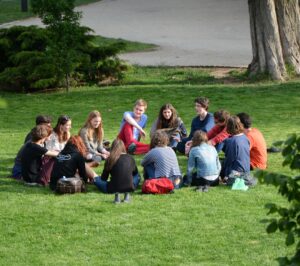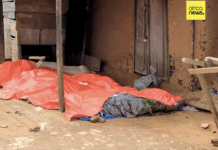
Houston, TX (ANS) – “You mean, you mean I don’t have to go through religion.” That was the response of a lady who heard the message of Jesus’ death, burial and resurrection. She realized that she didn’t have to be in a church building, that God is present in all places, and welcomes us to come to Him on the basis of what Christ has done on the cross. She was eager to call on the Lord and trust Him to save her and come into her life. Many people have had those kinds of encounters with Jesus, as a result of a short conversation and a simple, understandable presentation of the gospel message.
The Power of Prayer-Care-Share
In a recent effort to activate individuals to more intentionally reach out and share the Gospel, a group in a local congregation launched a prayer walking initiative. It’s actually much more than praying and walking. Cultivating a Prayer-Care-Share Lifestyle is one of the ways that can change the world. Equipping and activating followers of Jesus to identify God’s redemptive activity is a good starting place. There are opportunities we have every day to connect with people, have conversations, and introduce others to Jesus.

The Work of the Spirit
When followers of Jesus are properly trained with a few basic skills, and inspired by the Holy Spirit, they can simply make eye contact, smile, greet people, and watch how the Lord often opens up opportunities for life changing encounters. When it comes to communicating the love and message of Jesus, and making disciples, it is often better caught than taught. Observation, relational networking, group dynamics and participatory learning are more effective in most cases than lectures, books, text-based instruction or sermons.
How the Gospel Spreads
Those natural, spontaneous opportunities can happen regularly in our normal traffic patterns. We all live in a mission field, made up of our families, neighbors, co-workers or fellow students, and friends, as well as other connections we might have anywhere we encounter people. Consider how the Gospel spread throughout the entire populated world in the First Century, before the invention of radio, television, the internet, or the printing press. Think about how God preserved the accuracy of His message (His Word) in hearing dominant/oral cultures before it became a written text.

How Jesus Communicated
The more we understand about the Early Church, the better we can understand about what it will take to communicate the Good News of Jesus and make disciples among the least and last unreached people of the world. My friend Dr. Thom Wolf, a respected global missiologist, has said that the 21st Century Church may look a lot like the 1st Century Church. Consider how Jesus communicated His message and trained His disciples. How the disciples reproduced His message that has now resulted in more than 2 billion on the planet who identify with the Christian faith. (Recognizing, of course, that many identify themselves as Christians, but still are not true followers of Jesus).
Making Disciples – The Old Fashion Way
The simple lessons we learn from Scripture and the rapidly reproducing disciple making movements are actually more relevant and effective for spreading the Gospel than many of the methods being used in the modern Western World. From our learning journey with Living Water International, the International Orality Network, and other mission organizations, it is encouraging to see ordinary people come alive with new excitement and passion for the Great Commission. Communicating the gospel and making disciples are not as complicated as they have become in many Church traditions in North America and the Western World. Proper Orality Training and practices can equip ordinary followers of Jesus with skills that are biblical, simple, understandable and reproducible to all places and every people group on earth.

Simplicity and Reproducibility
Simplicity and reproducibility are vital to fostering multiplying movements. A pastor in an African country participated in one of Living Water International’s Orality Training for Trainers (OT4T) events. The very next week back in his home community, he trained more than 30 other pastors in the Orality methods he had just learned. A few months later we received reports of how the churches in that region were experiencing more growth and reproducing church planting efforts.
Integral Mission
Churches in Central America, Africa and Asia are discovering how Orality Strategies are enhancing their integral mission and community development efforts. USA-based ministries and churches are effectively using concepts and principles of Orality in sharing the Gospel and making disciples in prisons, nursing homes, among street gangs, and with refugee and immigrant communities, international students, and mission trips, to name a few. As the Orality Movement continues to grow, and there are increasing opportunities for cross-pollination, we are gaining a richer and fuller understanding of the multiple aspects and applications.
Small, Simple and Reproducible
Foundational, of course, to the effectiveness within the Orality Movement is prayer and the work of the Holy Spirit. The same Holy Spirit that was at work 2,000 years ago in the Early Church is still at work today. Imagine how just a few changes of methods and strategies can greatly accelerate the growth of the Jesus Movement. Mass meetings, big events and the use of radio, television and modern technology all have their place in today’s church/mission enterprises. However, the importance of small, simple, reproducible systems and structures are gaining the attention of many around the world. Jesus Himself focused on influencing the few, to impact the many.

Power of Parables
From the parables of Jesus, we can see the power of little things that make big changes. He said the Kingdom of God is like a mustard seed, and yeast. A very small seed can produce a large tree. A small amount of yeast can affect a large lump of dough. These principles of the Kingdom should encourage us to realize that the little things we do have the potential to make big changes in people’s lives. Seemingly simple and little things like acts of kindness, encouraging words and blessing others all have value and influence for good. The late Francis Schaeffer, in his book No Little People, explores the weakness and significance of humanity in relationship to the infinite and personal God. From God’s perspective, there are no little people or places.
For more information, visit – www.water.cc or www.orality.net.





